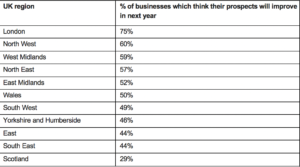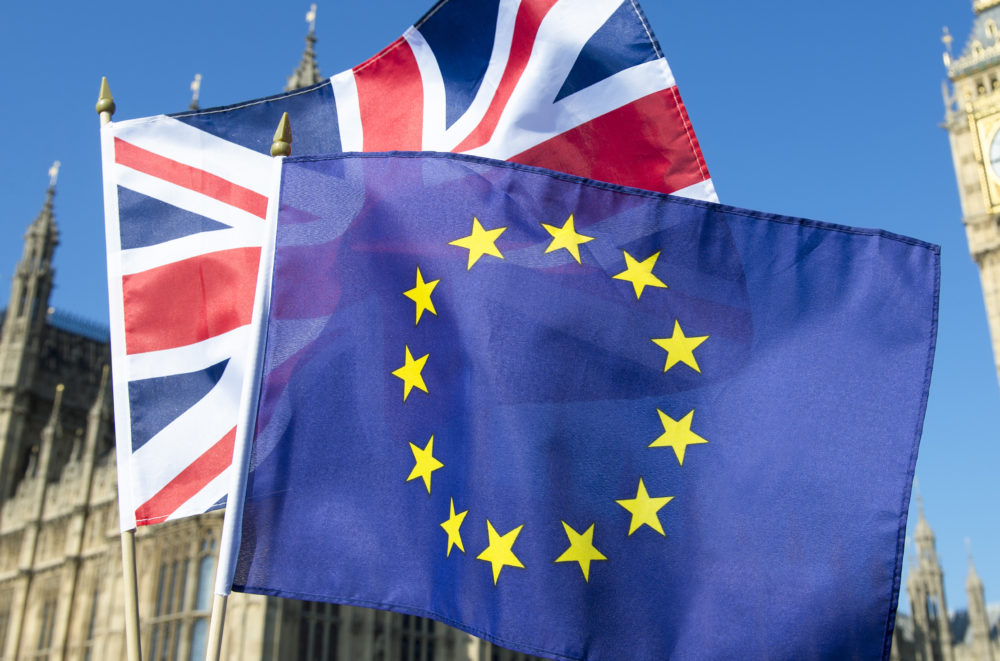Brexit has business leaders divided. On 29 May 2019, the UK will leave the European Union for good but what do fast growing businesses vital to the growth of the economy think?
Big business bossses like Sir Richard Branson think Brexit is bad for business, but new research is emerging that suggests SMEs are increasingly less worried about what Brexit could have on them.
Research from tax advisers Smith & Williamson shows the striking difference in regional sentiment amongst UK business leaders from 500 scale-ups and 500 non scale-ups in March 2018.

The figures are an increase on a Deloitte study in April 2017 which found 31 per cent of UK CFOs were optimistic on Brexit.
Kate Wickham, the managing director of manufacturing company Gate 7, based in the North-east, says the uncertainty surrounding Brexit means there is no plan for business in the UK.
‘The uncertainty is awful for people in business and makes it very difficult to plan anything. I don’t have a robust contingency plan, we are taking each day as it comes. It’s a really difficult one.’
Wickham, whose company recorded a 20 per cent upturn in sales last year to £4.2 million and hires 44 employees, is a remainer. She says, ‘I did vote to stay in Europe for business reasons. Firstly, due to our free trade agreement with Europe, because there was no guarantee that we’d be able to trade effectively with Europe if we left the EU.
‘Secondly, for general stability in Europe because (unlike a lot of people who voted and don’t care what happens on the continent), I massively care what happens in Europe because all our customers are there.
‘Like everybody, I was shocked but now I wish we’d just get on with it.’
But Gate 7’s business hasn’t been hit, yet, as the firm continues to gain new clients in Europe. Despite the recent good news, concerns remain.
‘There’s no doubt there’s an element of concern and trepidation but I am monitoring it. I can’t see the eventual impact going quietly. It’s everybody’s problem, not just exporters. Impact will be felt by every company because everyone’s supply chain is connected to Europe.’
India is the number one target now
Surely one method of contingency would be to redouble company efforts to gain new business in emerging markets, such as countries in Asia and the Far-east where economic growth is currently outstripping that of in Europe?
‘Exporting to South America, Australia and Africa is not that easy to do’, Wickham says realistically. ‘We have to look at where our market and customers are and they aren’t in these places. But we already do a lot of work in India, which is the furthest I can go currently. China, South Korea and Japan require you to set up offices there and I think that’s a big commitment for us to take on, especially when it comes to China.’
‘We already have two manufacturing plants in the US which was a big step for us.’
‘However, my primary focus is to establish a market in India.’
As Gate 7 has two large manufacturing plants in the US, clearly quite a lot rests on decisions made by the new president. Has Trump’s presidency affected Gate 7’s business in the US?
‘Business has been steadily going up over the last few years in the US, which was still part of the Obama years. Trump’s business background and his huge push and influence can only be a good thing for Gate 7,’ she concluded.
See more: Brexit: The pros and cons for SMEs
The possibility of Britain leaving the EU without a deal continues to strike fear into scale- up businesses (and everyone else too), as new figures from the chief executive of HMRC this week found a no-deal Brexit would cost UK and EU business up to £20 billion. However, so far, some businesses had seen stronger trading due to Brexit.
Brexit has given business a boost
The co-founder of party accessories company Talking Tables, Mark McCormack, said the business has been given a financial boost by Brexit so far due to the fall in the value of sterling. ‘Having invented our market we want to expand into new geographies before too many more competitors emerge,’ he said in a tax whitepaper by business networking company The Supper Club.
Talking Tables currently has yearly revenues of £16 million and employs 65 people. McCormack also called for greater exporting tax relief for the costs associated with entering new markets. The other co-founder of the company and McCormack’s wife Clare Harris said she supported Brexit. In an interview with Management Today, she said ‘I wasn’t comfortable with some of the dictates and rhetoric coming out of Brussels. We’re a very independent-minded nation and yet we were being bullied. I’m an eternal optimist and think we’ll come good.
‘I just hope the politicians don’t mess it up.’
A London based AI firm in healthcare who works with charities and educational organisations and grew revenues by 37.5 per cent last year, says Brexit increases its concerns about being able to attract talent from Europe as most of its 19 staff, which include data scientists, software engineers and marketing coordinators, are European.
However, the managing director of the company said Brexit could present opportunities to export its app platform outside of Europe, such as the US (currently its second biggest market) as well as India and Australia. Yet funding is a worry as some of it comes from the EU and it is fearful of the impact could have on its businesses partnerships in Europe.’
Brexit may reduce some of the opportunities to work with universities and organisations around Europe,’ the managing director said.






